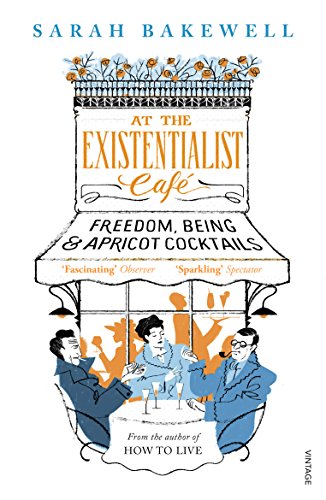At the existentialist cafe

Existentialism was always a confusing word at the edge of my psyche. I heard about it, especially in the phrase existential angst, but I never really understood what it was. More than that, although I was always interested in Simone de Beauvoir as someone who tended the light of feminism between the first and second waves, I hadn't heard great things about Satre, an apologist for Stalin etc.
As an encouragement to those who say intelligent things to other people and think they may go unnoticed, a Spanish colleague of mine, Raul, told me not to dismiss Satre, and that he thought I would love him. I filed that away in my memory bank for a potential later excursion, which didn't happen until fourteen years later when I took some time off work and consequently had time to think.
Watching a number of discussions and documentaries about existentialism, I got more and more interested. As a self-identified Athiest who thinks there is still the possibility of meaning outside of solipsism, the major realisation from this book is that I am in some aspects an existentialist, as perhaps all non-nihilistic Atheists must be.
The book is so wonderful, for both its stories and philosophy, I almost resented finishing it. Indeed I am very driven to read it again so I can further commit its pages to memory. I don't agree with everything, either within existentialism or the views of the author, but it was a wonderful introduction to phenomenology and existentialism. If you don't really know what those things are, start with this book to understand two of the twentieth century's major philosophical movements.
The stories about the characters, Heidegger, Arendt, Camus, Merleau-Ponty and others including the two main protagonists Satre and de Beauvoir are mesmerising. I had no idea that Satre felt he was being followed by giant lobsters after taking psychedelics, that Heidegger had affairs with at least two Jewish women before joining the Nazi party, or that Sartre and de Beauvoir were involved in such a complicated love triangle that de Beauvoir had to simplify it in her work of fiction based on it, presumably so it was more believable. There is some sexual deviancy amidst the philosophy, much of which would be condemned today. I can't help being sympathetic to their belief in freedom in all things, but it is an ideal that clashes in unpleasant ways against the reality that not everyone understands or is empowered enough to claim their freedom.
I love the exaggerated expressions in some of the work like Sartre's "We are condemned to be free", and I imagine them being said in the bad french accent my imagination conjures. He says that this realisation, and our inability to know what to do with it, is the source of anxiety etc. I'm unsure if it is true but I love the general area of thinking. People need to understand their freedom to remake themselves and the world. Of course, Satre hadn't had the benefit of reading works like the Blank Slate by Steven Pinker or dwelt within the current intellectual fashion of our lack of free will. Sartre felt that we could make whatever we wanted of ourselves in this life. Indeed I wonder if his statement "existence precedes essence" which he says is at the root of existentialism, would be tempered by a modern understanding of genetics. As lovely as the idea that we are completely free to be who we wish might be, there is also a certain beauty in our inextricably link to the natural, evolutionary world. That we share something deep with all other beings, including our limitations, and therefore we cannot retire to the mountain of our own thoughts but must all figure out how to live together, as partly free, partly interdependent beings.
I believe there is a crisis of meaning in society. That we must find a shared sense of meaning in order to drive our civilisation forward. Existentialism is one of the most sincere attempts at finding that meaning, and this book is a wonderful introduction to this school of philosophy.
Use your freedom wisely by reading it.
Find this book
Search for a second hand copy of At the existentialist cafe on World of Books